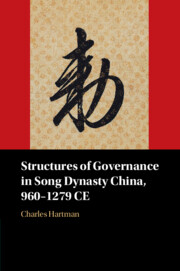Book contents
- Structures of Governance in Song Dynasty China, 960–1279 CE
- Structures of Governance in Song Dynasty China, 960–1279 CE
- Copyright page
- Contents
- Figures
- Tables
- Preface
- Notes on the Cover and on the Text
- Introduction
- Part I Dual Faces of the Song State
- Part II The Technocratic and Confucian Models of Governance
- Part III Interactions
- 9 What Zhu Xi Told the Emperor
- 10 “Us against Them”: The Southern Song, 1162–1182
- 11 Deeper Structures of Song Governance
- Epilogue
- Appendix of Senior Administration Positions, 1162–1182
- Bibliography
- Index
10 - “Us against Them”: The Southern Song, 1162–1182
from Part III - Interactions
Published online by Cambridge University Press: 30 March 2023
- Structures of Governance in Song Dynasty China, 960–1279 CE
- Structures of Governance in Song Dynasty China, 960–1279 CE
- Copyright page
- Contents
- Figures
- Tables
- Preface
- Notes on the Cover and on the Text
- Introduction
- Part I Dual Faces of the Song State
- Part II The Technocratic and Confucian Models of Governance
- Part III Interactions
- 9 What Zhu Xi Told the Emperor
- 10 “Us against Them”: The Southern Song, 1162–1182
- 11 Deeper Structures of Song Governance
- Epilogue
- Appendix of Senior Administration Positions, 1162–1182
- Bibliography
- Index
Summary
Chapter 10, “‘Us against Them’ – The Southern Song, 1162–1182,” reviews scholarship on the nature of Emperor Xiaozong’s rule and presents a detailed political history of these two decades. This chapter maps the two forces that Zhu Xi describes as locked in perpetual political conflict – “Confucian literati” and “the close” – onto the technocratic–Confucian model to identify the principal actors on each side. Prominent among the former were officials with Confucian daoxue sympathies like Chen Junqing 陳俊卿 (1113–1186), Zhou Bida 周必大 (1126–1204), and Zhao Ruyu 趙汝愚 (1140–1196), who led a series of successive institutionalist administrations, most notably Chen Junqing’s coalition of Fujian and Sichuan literati between 1167 and 1169. Prominent among “the close” were Zeng Di 曾覿 (1109–1180) and affinal kinsmen Qian Duanli 錢端禮 (1109–1177) and Zhang Yue 張說 (d. 1180). This narrative demonstrates that Xiaozong attempted to create a balanced administration that utilized leadership from both groups. Largely due to Confucian recalcitrance, his attempts were unsuccessful, and senior leadership, as reflected in the membership of the Council of State, alternated back and forth between the two groups during these two decades. Finally, after 1181, Xiaozong tapped several “centrists,” Wang Huai 王淮 (1126–1189) and Liang Kejia 梁克家 (1128–1187), officials with sterling literati credentials, but few Confucian convictions, who were willing to work with the technocrats to achieve the balanced governance he desired.
- Type
- Chapter
- Information
- Structures of Governance in Song Dynasty China, 960–1279 CE , pp. 278 - 340Publisher: Cambridge University PressPrint publication year: 2023



